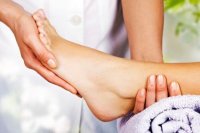 High heels hurt, and there are many reasons why you should swap them for more comfortable shoes. Wearing high heels alters the positioning of your feet and gait, affecting your spine posture. It upsets your body balance, and can even result in blisters, corns, and bunion problems. According to Yahoo!, “wearing high heels every day can shorten calf muscles by up to 13 percent, as well as thicken and stiffen the Achilles tendon.” A study done by Stanford University in 2014 suggests that the strain can also lead to higher risks of osteoarthritis. If you still want to consider high heels, Yahoo! recommends getting the most comfortable heels, like wedges, which have thicker heels. Shop for shoes at night, when your feet are at their largest due to the swelling of fluid during the day, and maintain a healthy calcium balance to ensure your bones and muscles are strong.
High heels hurt, and there are many reasons why you should swap them for more comfortable shoes. Wearing high heels alters the positioning of your feet and gait, affecting your spine posture. It upsets your body balance, and can even result in blisters, corns, and bunion problems. According to Yahoo!, “wearing high heels every day can shorten calf muscles by up to 13 percent, as well as thicken and stiffen the Achilles tendon.” A study done by Stanford University in 2014 suggests that the strain can also lead to higher risks of osteoarthritis. If you still want to consider high heels, Yahoo! recommends getting the most comfortable heels, like wedges, which have thicker heels. Shop for shoes at night, when your feet are at their largest due to the swelling of fluid during the day, and maintain a healthy calcium balance to ensure your bones and muscles are strong.
High heels have a history for causing foot and ankle problems. If you have any concerns about your feet contact Dr. Sharon L. Pletcher of Pennsylvania. Our doctor will treat your foot and ankle needs.
Effects of High Heels on the Feet
High heels are popular shoes among women because they are associated with femininity. Despite their appeal, they can cause many health problems if worn too frequently.
What parts my body will be affected by high heels?
- Ankle Joints
- Achilles Tendon – may shorten and stiffen with prolonged wear
- Balls of the Feet
- Knees – heels cause the knees to bend constantly, creating stress on them
- Back – they decrease the spine’s ability to absorb shock, which may lead to back pain. Also, the vertebrae of the lower back may compress.
What kinds of foot problems can develop from wearing high heels?
- Corns
- Calluses
- Hammertoe
- Bunions
- Morton’s Neuroma
- Plantar Fasciitis
How can I still wear high heels and maintain foot health?
If you want to wear high heeled shoes, make sure that you are not wearing them every day, as this will help prevent long term physical problems. Try wearing thicker heels as opposed to stilettos to distribute weight more evenly across the feet. Always make sure you are wearing the proper shoes for the right occasion, such as sneakers for exercising. If you walk to work, try carrying your heels with you and changing into them once you arrive at work. Adding inserts to your heels can help cushion your feet and absorb shock; you can buy either full inserts or metatarsal pads.
If you have any questions please feel free to contact our office located in State College, PA. We offer the newest diagnostic tools and technology to treat your foot and ankle needs.




